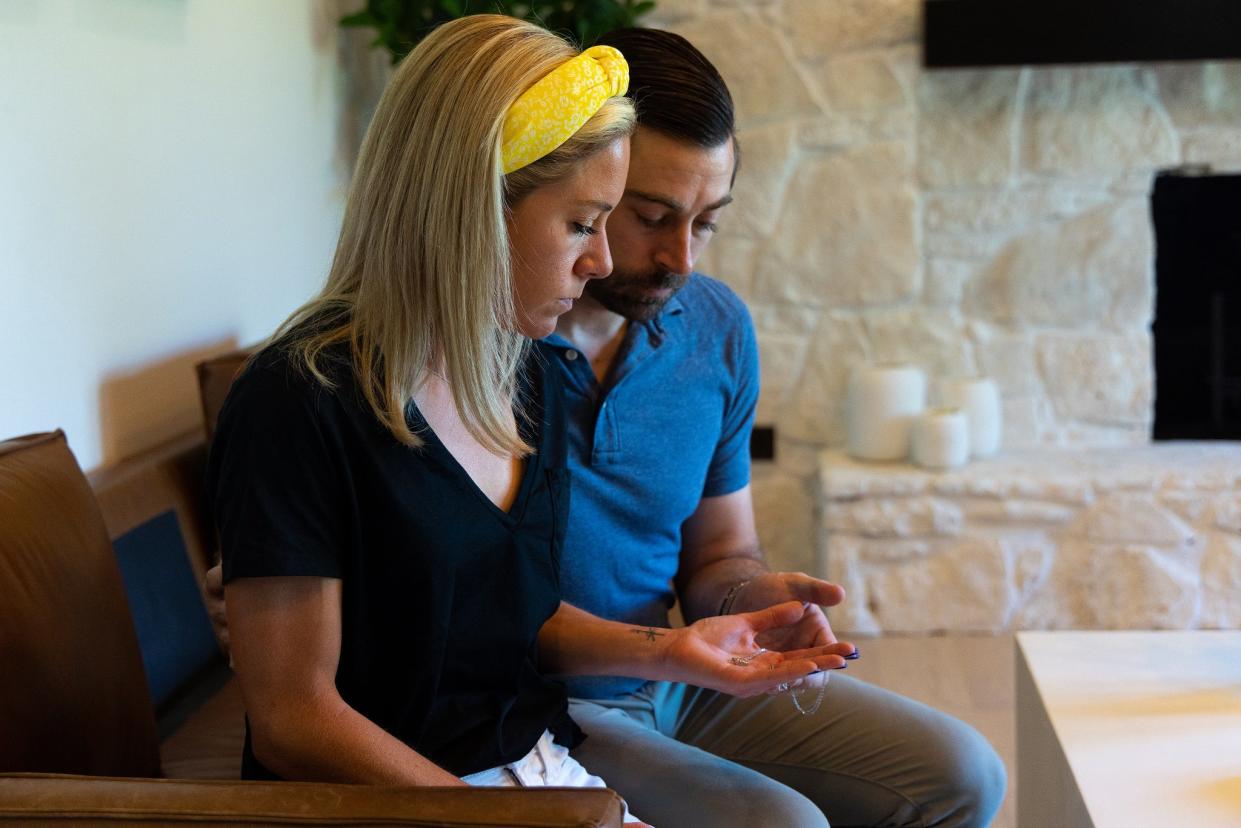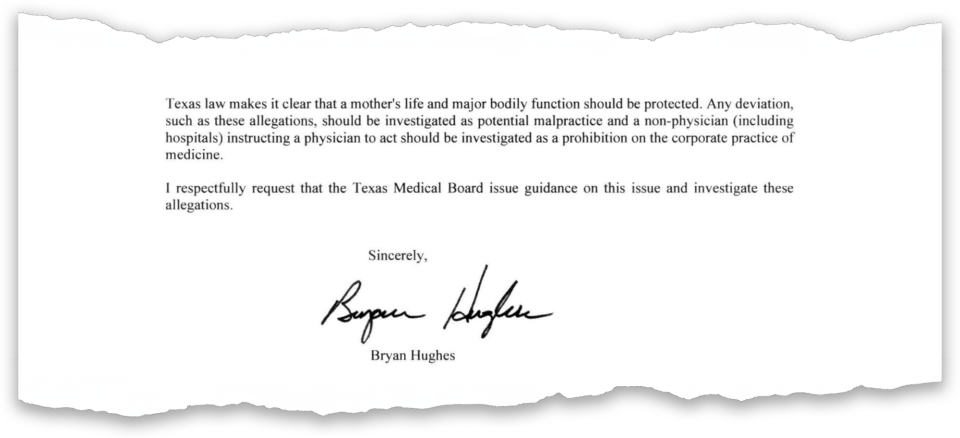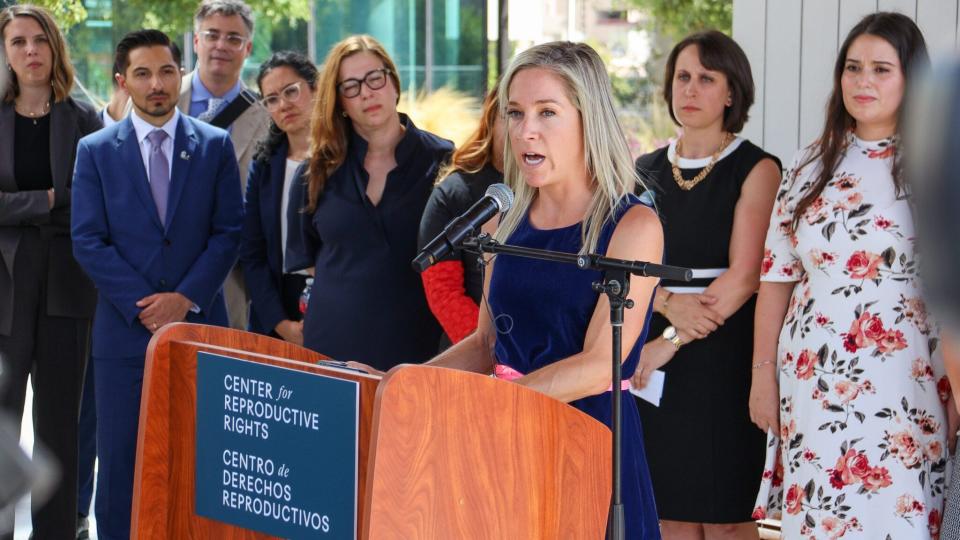‘It was just despair’: Abortion bans leave doctors uncertain about care - even in emergencies

AUSTIN, Texas – Amanda and Josh Zurawski sit in the house they bought last year, the dream home they intended to share with their daughter.
They’ve told their story too many times now, but they brace themselves to tell it once more – from a room just above the backyard where they will one day plant a tree in memory of the baby who never made it home.
The Zurawskis went through about 18 months of fertility treatments before learning that Amanda was pregnant in spring 2022. But that August, when she was about 18 weeks along, something went terribly wrong.
At the hospital, Amanda was diagnosed with cervical incompetence, meaning there was virtually no chance her baby would survive past an inevitable premature birth. Normally, doctors would perform an abortion to end the pregnancy to prevent the mother from developing an infection.
But Roe v. Wade had been overturned one month earlier, and the Zurawskis live in Texas – where abortion is banned at six weeks and a second trigger law was just days away from taking effect, allowing abortions only if the mother has a life-threatening condition, risks death or faces “substantial impairment of a major bodily function.”

“Her heart was still beating, and my life wasn't considered at risk,” Amanda said. “So until one of those two things changed, they couldn't do anything.
“We just had to wait.”
She was sent home with instructions to monitor herself for infection. Days later, she developed sepsis. Her baby, Willow, was delivered – and died. Now Amanda may never be able to have a child.
“It was just despair,” she says. “People shouldn't have to die for lawmakers to change some of these restrictions.”

While the abortion debate often centers on elective procedures, the reality is that out of the hundreds of thousands of abortions performed in the U.S. annually – at least 620,000 in 2020, according to government statistics – many are because of medical emergencies or to end a pregnancy where a baby would not live long, if at all.
Yet in Texas and beyond, pregnant individuals have been unable to get needed care because of state abortion bans that have left doctors unsure of what procedures they can perform without facing civil or even criminal liability.
A year after the U.S. Supreme Court ended federal abortion protections, 20 states have laws banning abortion at 18 weeks of pregnancy or earlier. Restrictive states have exceptions to preserve the life of the mother, but trying to interpret those has put both doctors and patients in a potentially life-threatening bind.
Already, studies are showing the effects of these laws on maternal health.
In one paper, researchers interviewed 50 providers across Texas who cared for patients with life-limiting fetal diagnoses or who had health conditions that threatened their pregnancies.
Even before implementation of the state’s six-week ban, “administrative approval processes and referrals for abortion delayed care and endangered patients’ health,” the study found, but the ban worsened things.
“You really can barely imagine what it’s like for a woman or a couple to be faced with a devastating diagnosis for the fetus … and then they're told by the doctor, ‘Well, good luck to you. Jump on Google and see where you can find a place to get your termination,’” one specialist told researchers. “It's just horrifying.”

At the University of California San Francisco, researchers are in the midst of another study examining the impact of abortion bans on clinical care. Early results published in May found these laws had contributed to delays in treatment, poorer health outcomes and increased costs.
“In several cases, patients experienced preventable complications, such as severe infection or having the placenta grow deep into the uterine wall … because clinicians reported their ‘hands were tied,’ making it impossible for them to provide treatment sooner,” researchers wrote.
For many OB-GYNs, the connection is clear: abortion bans compromise maternal health.
“There's not a line in the sand where someone goes from being totally fine to acutely dying,” said Dr. Nisha Verma, an Atlanta OB-GYN. “We've definitely seen a correlation in the data between states that have more abortion restrictions and those that have worse maternal morbidity and mortality – and we're already seeing this play out.”
Dr. Crystal Berry-Roberts, an OB-GYN in Austin, said there’s a “disconnect between lawmakers and the reality of this. It's easy to lobby for something … when you don't see it as something that is knocking at your back door.”
Some lawmakers say none of this was what they intended.

Texas state Sen. Bryan Hughes, the Republican who sponsored the state’s six-week ban, did not respond to an email or phone messages from News21.
But in an August 2022 letter to the Texas Medical Board, he said he was aware of complaints that hospitals may be prohibiting or delaying life-saving care to patients with pregnancy complications. He pointed to “confusion or disregard” of state laws allowing for abortion in medical emergencies, and said the issues must be corrected.
Amy O’Donnell, spokeswoman for the anti-abortion Texas Alliance for Life, said that clarification needs to come from the Texas Medical Board – not the Legislature.
“For any physicians who are perhaps … confused on our clear pro-life laws, I would just encourage them to also reach out and see if they can get that clarification,” she said.
In Texas, 13 women and two doctors have sued the state, seeking to clarify the scope of the exception in state abortion laws and secure a judgment that they violate the Texas Constitution when applied to pregnant people with emergent conditions and the doctors who treat them.
Most of them had to spend extensive time, money and energy traveling elsewhere to get abortions. Several had to wait at home, eventually delivering their stillborn babies.
Some, like Amanda Zurawski, suffered complications that now put them at higher risk of experiencing difficulties getting pregnant again – or delivering a healthy child.

On Aug. 4, a Texas judge issued an injunction blocking the state’s enforcement of abortion bans in emergency situations and saying doctors may use their own judgment to determine when to terminate a pregnancy in an emergency. The Texas Attorney General’s Office appealed that to the state Supreme Court, and the bans remain in place pending the high court’s decision.
“If I had one single message to the general public it would be: Realize that the pregnancies we’re talking about in this lawsuit are all wanted pregnancies – very wanted pregnancies – that then were complicated by a condition … where abortion became the best response to it,” said Dr. Judy Levison, a retired Houston OB-GYN who joined the lawsuit as a plaintiff.
“I’m sure there are many of the women involved in the lawsuit who never thought they would ever – ever – have an abortion … and yet when faced with the reality of a medical complication realized, ‘Oh my gosh, that’s what I need to save my life.’”
News21 reporters Peyton Brooks, April Michelle Pierdant, Jada Respress and Joseph Kual Zakaria contributed to this story. This report is part of “America After Roe,” an examination of the impact of the reversal of Roe v. Wade on health care, culture, policy and people, produced by Carnegie-Knight News21.
For more stories, visit https://americaafterroe.news21.com/.
Carnegie-Knight News21 is a national reporting initiative headquartered at Arizona State University’s Walter Cronkite School of Journalism and Mass Communication that brings top journalism students from across the country to report and produce in-depth, multimedia projects.
This article originally appeared on USA TODAY: Abortion bans compromise maternal health, doctors say

